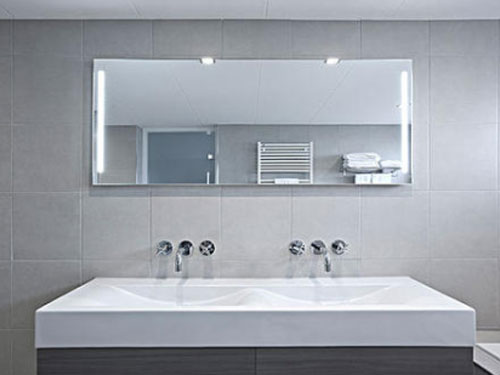
Bathroom lens glass is an amorphous inorganic non-metallic material, which is generally made of a variety of inorganic minerals (such as quartz sand, borax, boric acid, barite, barium carbonate, limestone, feldspar, soda ash, etc.) as the main raw materials, in addition to a small amount of auxiliary materials. Its main components are silica other oxides. The chemical composition of ordinary glass is Na2SiO3, CaSiO3, SiO2 Na2O · Cao · 6sio2. The main component is silicate complex salt, which is an amorphous solid with irregular structure. It is widely used in buildings to prevent wind light, belongs to mixture. In addition, the colored glass mixed with some metal oxides salts, toughened glass made by physical chemical methods, etc. Some transparent plastics (such as polymethylmethacrylate) are sometimes called plexiglass.
The molecular arrangement of glass is irregular, its molecules have statistical uniformity in space. In an ideal state, the physical chemical properties of homogeneous glass (such as refractive index, hardness, modulus of elasticity, coefficient of thermal expansion, thermal conductivity, conductivity, etc.) are the same in all directions.
No fixed melting point
Because glass is a mixture, non crystal, there is no fixed boiling point. The transformation of glass solid to liquid is carried out in a certain temperature range (i.e. softening temperature range), which is different crystalline material has no fixed melting point. The softening temperature range TG ~ T1, TG is the transition temperature, T1 is the liquidus temperature, the corresponding viscosity is 1013.4 DPA · s, 104 ~ 6 DPA · s, respectively.
Metastable
Generally, glassy materials are obtained by rapid cooling of the melt. When the melt state changes to glassy state, the viscosity increases sharply during the cooling process, the particles cannot be arranged regularly to form crystals without releasing latent heat of crystallization. Therefore, glassy materials have higher internal energy than crystalline materials, their energy is between the melting state the crystalline state, which belongs to metastable state. the mechanical point of view, glass is an unstable high-energy state, for example, there is a trend of low-energy state transformation, that is, there is a tendency of crystallization, so glass is a metastable solid material.